Hard Passages
Should you care about any of this? He was just living his life, trying to be successful, taking care of his family. Who takes the measure of our lives? Our families, usually, but the wider world, only a bit. None of us really matters I suppose unless we matter to someone else. Maybe that’s love.

There wasn’t but five dollars difference between the two of us.
We met my first day on the job at the television station in Austin. I had moved up from Laredo, where I had been anchoring the early and late news and had accepted a position as a reporter at the NBC affiliate in the capitol city. Many hours of my spare time had been spent sitting on the wooden steps to our single-wide trailer staring at northbound traffic on Interstate 35. It was the only time in my life I had ever dreamed of going north as a goal.
The rest of my free time was spent calling TV stations around the country looking for a better job than the $1100 a month I was earning while reading, writing, and anchoring the news down on the border. I edited together sample segments of my work and sent them off to prospective news directors, hoping to get a new job. Instead, I was provided with unique rejections by potential employers. After looking at my tape, a news director told me, “I don’t know what I am looking for, but I’ll know it when I see it and you’re not it.”
Until Austin.
We had wanted to live there since moving to Texas, and finally a station manager had decided to hire me to be a street reporter. The 1979 salary offer was $185 a week with one-week annual paid vacation. Fortunately, my bride found a good job very quickly and we rented a little house only a few blocks from the same Interstate and started making friends. The first day in the newsroom, Ken Vest, another reporter, invited me to shoot baskets with him in Enfield Park when we got off the air.
“You came from Laredo, huh?” Ken had just rimmed out an awkward jump shot.
“Yeah, we wanted to get out of there, get some exposure,” I said. “The border is still a bit of the wild west.”
“Well, if you were anchoring, you must have made good money. You sacrificed that to come up here?”
He was getting right to it. I liked this guy. “I wasn’t making that much.”
“But probably thirty or forty thousand, I would guess.”
“You guessed way off. About a fourth of that. I didn’t sacrifice anything.”
“Yeah, this place is cheap. Since we are both street reporters, I assume they are paying you the same thing I get,” Ken said. “You make $180 a week, too, eh?”
“No, a bit more. But not much.”
Ken sent the ball in my direction with a hard chest pass. “Oh, come on. Don’t tell me you’re making more than me.”
“You kind of asked, didn’t you? I’m making $185 a week.”
“Are you serious? Man, what crap. He told me $180 was the tops for a reporter at the station, and he gave you $5 more? I’m pissed.”
“Does seem a bit odd. But sheesh, five bucks isn’t anything to get hung up on,” I said. “Come on, let’s go get a beer and I’ll spend that amount and we’ll be even.”
“I’m pissed,” Ken said. “I’m really pissed.”
He really wasn’t, though. The guy was happy, and I came to learn, almost absurdly optimistic. We ended up at Scholz Beer Garten, the old German restaurant, dance hall, bowling alley, and beer joint. Ken started telling me about a novel he loved that had been set in a fictional version of Scholz, which was about an LBJ-like character who becomes president.
“You’re talking about ‘The Gay Place,’ obviously,” I said.
“
Yeah, you know it?”
“Of course. Second greatest political novel ever written.”
“There’s something better?”
“Yeah, ‘All the King’s Men’ by Robert Penn Warren. It’s about Huey Long of Louisiana.”
Our conversations over the next four decades generally unrolled in a similar fashion. I was never sure how we became such fast friends. My personality was partly cloudy on good days and Kenny’s was decidedly sunny and hopeful. Maybe we were both aspirational in the same manner. We wanted to make it to one of the top ten television markets or even land a job with a network. Our career paths ran parallel after Austin, also, when we were both hired in Omaha to launch one of the early “Live at Five,” newscasts.
Ken Vest had come down to Texas from Wyoming. He had a reporter’s job in Casper and had convinced his girlfriend to leave Washington, D.C. so he could launch his career. Although he had been raised in Houston, Ken had left for Washington, D.C. after earning his degree and doing a tour of duty in the Army during the Vietnam Era. He had graduated from Southwest Texas State University (Texas State), where LBJ had studied to be a teacher. A classmate, Powers Boothe, became an accomplished actor and had gotten a break to star in a TV movie about cult leader Jim Jones in Guyana, which was broadcast while we were both working nights at the CBS affiliate the Omaha.
“Holy crap, look at that,” Ken was pointing at the TV screen. “I can’t believe it. Oh no.”
“What? Your story? They screw up the edit?”
“No, look at the two screens. Powers is on one acting and is likely to get an Emmy, and I’m on the other screen doing a standup from the landfill in Pottawatamie County in Iowa. Yee haw!”
The juxtaposition came to be a misguided metric Ken relied on to measure his own success, but only sarcastically. He had surrendered his acting ambitions and had decided to become a reporter, but he had shared the stage in college with Powers Boothe. The landfill story, though, set their accomplishments in graphic relief. Ken dealt with the differences by relying on laughter and self-deprecation.
“Even worse,” he said as he watched his friend Boothe in the movie. “There’s this homeless woman living out near there somewhere and she kept getting in the way as I was doing my standup. I finally had to ask her to leave. But she just looked at me and said, ‘Why should I leave? You somebody important?’ Ha, sure, lady, I’m doing news in the county landfill, and I’m somebody important.”
Ken had doubts about himself and even more regarding the people who ran the news industry. He began to realize his hard work and polished skills were not necessarily going to take him to his goal. Hiring decisions in television tended to be subjective. A person’s face and voice are more relevant than journalism awards. When he had that realization, Ken’s life became more traditional, and he was even happier. His concentration shifted away from his career and moved in the direction of his family, his wife, Sue, and his two boys Jeremy and Jesse, and he launched a career in public relations. There were much better methods for measuring performance than the aesthetics of how a person looked and sounded.
Why, you are asking yourself, should I care about any of this? You probably shouldn’t. Ken was unknown, except to friends and family, which makes him like most of us. He was just a person who was living his life and trying to be successful and take care of his family. That’s why I’m writing this, and you are curious. Who takes the measure of our lives? Our families, usually, but the wider world, only a bit. None of us really matters, I suppose, unless we matter to someone else. Maybe that’s love.

Pancho and Lefty
We always want to take meaning out of our personal scratchings in the dirt. Who noticed us? Did anybody really care after we were gone? Did we do anything that amounted to much, and were we even supposed to? Isn’t it sufficient to just live, care about people, be honorable and do the obviously right thing? That’s why I’m writing this about Ken. Because he mattered to me. What he did, who he was, became a part of me in the way only can happen with best friends. His life has passed now with little note, the way most of ours expire. But maybe that’s how it is supposed to be.
I shocked him on that day we played basketball when he asked me about my career goals and how long I planned on staying in Austin. I told him I was already sending out tapes on my first day on the job. I expected success to be a long process and figured I needed news directors to become familiar with my face and work. Might have been an insult to my new employer, but I gave the disease to Ken, and he began firing off “audition tapes” to TV newsrooms. We may have seen each other at the Post Office more than we did at the TV station.
While I was in a constant state of constructive dissatisfaction, Ken was happy. He was always out there on the morning side of the mountain where wonderful things began every day. Mostly, it worked out for him, though he knew tragedy when he lost his son, like many parents, to a drug overdose. Ken was wounded in a manner that never completely allows healing. But he pressed on as a husband and a father to his other son.
And that’s it. There’s no reason to need more or burn with the fire of ambition. There are friends, and family, a few people to love, backyard events and baseball games, books and political theory, road trips and live music, travel and mountains, lobster and crab and sourdough bread, and a million other things and moments that make up a live. That’s what Ken’s was comprised of, and more than a bit of laughter.
When he was receiving radiation for a cancer treatment, Ken’s bones were weakened, and he fell and fractured a part of his spine, which led to surgery and then to opioids and steroids and various other drugs that were attempts to address his pain. They failed, and Ken kept descending until the point at which his great heart stopped. He was gone at 77, and as is the way with loss, I am trying to take him into account, examine a life that no one knows was well lived other than the person living it.
None of this is important, though. He was my friend. We sat in the car as our wives waited for us at home, and we parked facing the beach on the Outer Banks and sang along with Willie and Merle on “Pancho and Lefty,” and I gave his son Jesse’s eulogy. We were that kind of close. Ken was the guy that I could call if I ever got wrongly imprisoned in a Turkish jail because I know he would not have rested until he got me out, legally or otherwise. Who gets a friend like that?
I had never had a friend like Ken Vest. I doubt I ever will again.